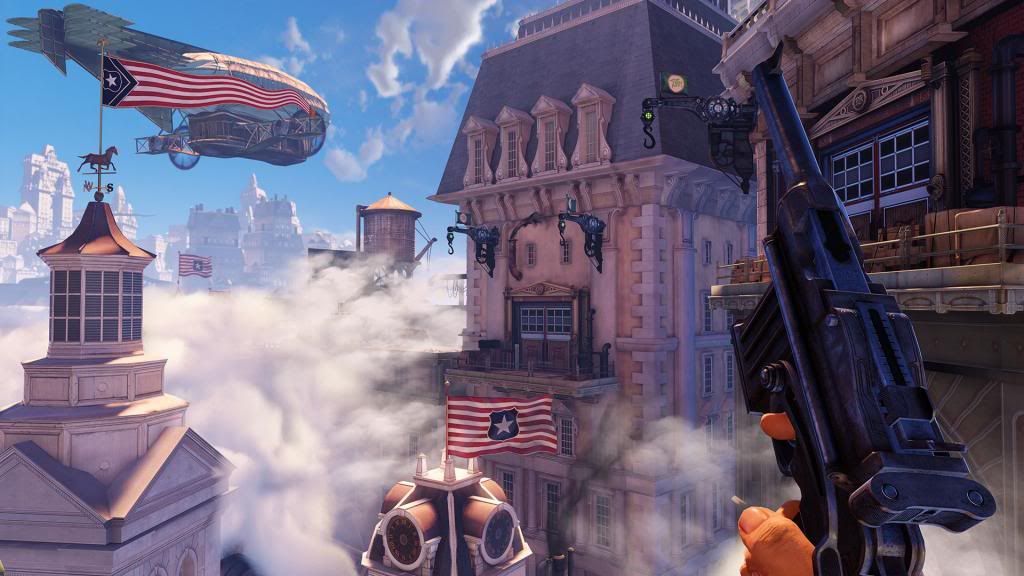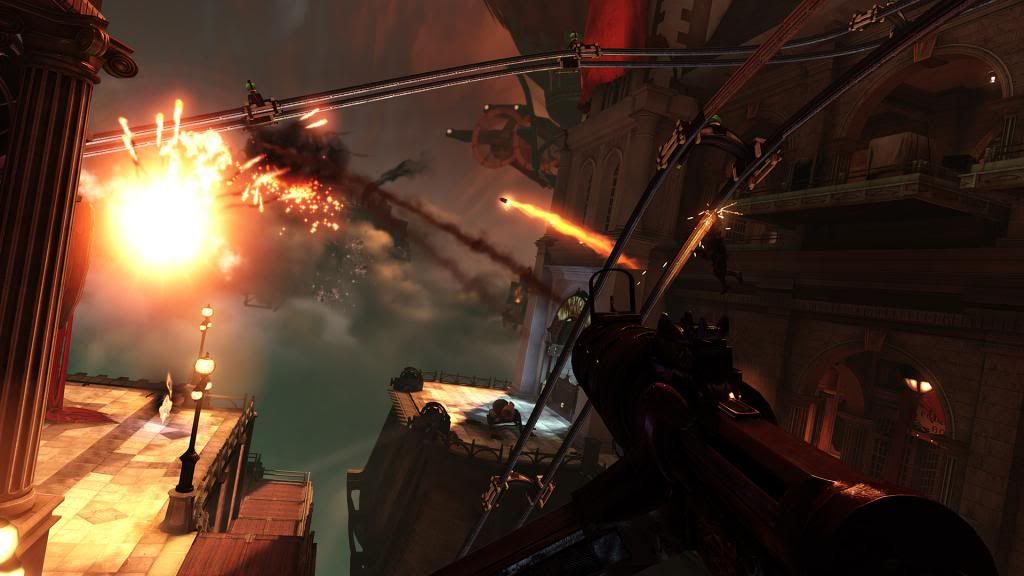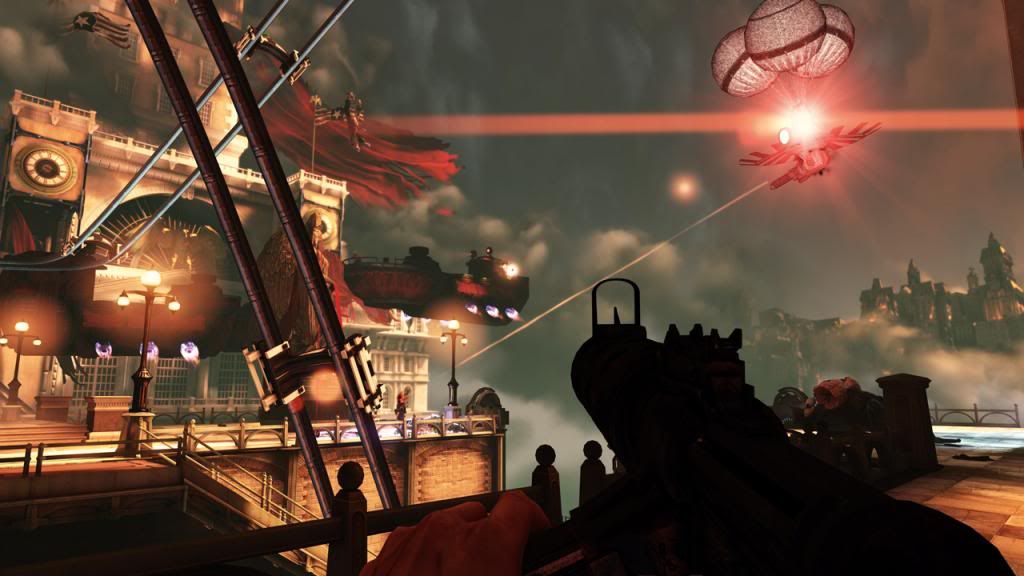
- Format: PC (version reviewed), 360, PS3
- Unleashed: Out Now
- Publisher: 2K Games
- Developer: Irrational Games
- Players: 1
- Site: http://www.bioshockinfinite.com/
To many people the original Bioshock was a prime example of a fantastic gaming experience – a masterpiece of well executed gaming, mood, plot and environment. It made a city under the sea believable. The team responsible for that game now turn their hands to Bioshock Infinite and a city in the sky.
You play as Booker DeWitt, a gun for hire deep in debt willing to do almost anything to weasel his way out of it. He is given the task of visiting the floating city of Columbia, which seceded from the US and is now ruled over by a so-called Prophet, finding a specific girl named Elizabeth and bringing her back to wipe away his debt forever.

Comparisons to Bioshock and Rapture specifically are impossible to ignore, but Columbia is a different beast for many reasons. In Bioshock you were late to the party – you were seeing Rapture years after it fell into death, decay and addiction, lending it (perhaps indirectly) an intimidating air; but in Infinite you are not only seeing Columbia in its prime but are directly responsible for things changing. It’s the first of many ways that the game attempts to come at you from a different direction, to forget Rapture and have a different experience.
It is hard not to appreciate the obvious amount of work that has gone into creating Columbia and we say that both in terms of being a joy to explore but also the attention to detail by the creators. The ironically lofty religious zeal that the city bleeds from every orifice the very moment you get there is unmistakeably purposeful. It feels like there was a reason behind every seemingly unimportant day-to-day moment you see as the game builds to the moment when things start to go wrong for DeWitt.
The moment we speak of is when you join a crowd that is preparing to bombard an interracial couple with balls. It is the first of many examples of the prejudiced opinions of Columbia’s inhabitants. Given the time it is set in and the people occupying the city this never feels desperate, and only ever uncomfortable when it is supposed to be. The player is never expected to side with the racist views of the people around them but nor are they expected to oppose it – it is simply there to be noticed for the most part, and whether you choose to ignore it or use it as motivation or justification for the things you do is down to your own choice.

The game is very well acted by the entire cast and the musical tracks apt for the period. What we were especially impressed by is how the game uses musical cues within the combat. Enemies being hit by critical hits, headshots or special melee finishers all cause dramatic melodic riffs that you’ll soon become acquainted with. It almost seems pointless in terms of achieving anything at first, yet as you become accustomed to hearing the chimes and violin strokes they will add some indeterminable importance that can’t be put into words.
Spending so long talking about the wonderful world you are let loose in to explore, change and irreconcilably damage is easy and a joy to do – partly because the other areas of the game are somewhat unremarkable. If you played Bioshock or Bioshock 2 you will be right at home with the combat that mixes gunplay and Vigors (comparable to the Plasmids of the other games) which delve into the realms of science fiction/fantasy and give DeWitt the ability to do such things as summon a murder of crows to attack enemies.

We were disappointed that there was so little variety in the Vigors available to the player. Essentially they all fall into the ‘press once to launch at foe – press and hold to lay a trap version’ school of play other than one or two exceptions meant for distraction rather than direct damage. It discourages replays when the only difference in powers is their visual representation, and this is confounded by the utter lack of visually distinctive weapon upgrades. Coupled with DeWitt’s inability to ever carry more than two weapons at any one time and the chance (or desire) to experiment compared to the Plasmids of Bioshock is gone.
A further low point is is how insultingly easy the game is even at the default difficulty of medium. We strongly encourage bumping that up straight away if you want any kind of challenge – not that death is ever much of a hindrance, thanks to Elizabeth constantly helping you back to your feet through most of the game. On that subject though the game never feels like an escort mission and you are actively encouraged not to worry about her safety and cut loose in fights, which is a smart thing to do.

Despite rather dull combat without experimentation, Bioshock Infinite is still a terrific experience. Columbia is a remarkable place to explore and even though we preferred the macabre vibe that Rapture exhibited we still appreciated the time and attention to detail spent creating Columbia and the people inside it. The story builds and builds to a mind-bending finish that – if it weren’t for an event in the first 30 minutes which mimicked an episode of Futurama with a disturbingly similar concept for an overall plot – will probably have most people’s jaws hitting the floor. While we would still recommend Bioshock more, we recommend not missing Bioshock Infinite, as a decent experience like this doesn’t come along nearly often enough.
The score below represents enjoying the dramatic journey through a well made setting and story with likeable characters, more than gameplay that – as we said – is fairly forgettable. Keep that in mind depending on what you value more.




Comments